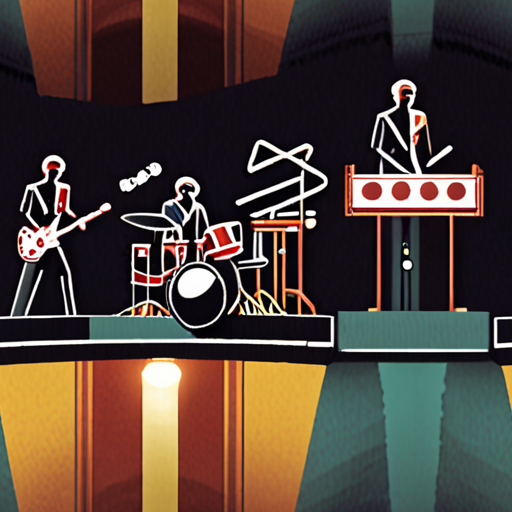The process of organizing a band tour is a complex and multifaceted endeavor that requires careful planning, coordination, and execution. For anyone looking to master the art of planning a successful concert tour, understanding the key components and best practices is essential. Whether you’re an independent artist, a small label, or part of a larger team, organizing a band tour involves navigating a series of challenges from logistics to budget management. This guide will walk you through the steps to plan a band tour, explore the roles involved, and provide insights into how to overcome common obstacles. By mastering the intricacies of organizing a band tour, you can ensure your concert series runs smoothly and leaves a lasting impression on your audience. From hiring the right tour manager to coordinating logistics and managing budgets, this article will equip you with the knowledge needed to plan a tour that exceeds expectations.

How to Organize a Band Tour
To successfully organize a band tour, follow these organized steps:
1. Define Your Goals
Clarify what you aim to achieve with the tour. Whether it’s increasing fan engagement, promoting a new album, or simply connecting with your audience, knowing your objectives will shape your strategy.
2. Create a Budget
Estimate costs including travel expenses, venue rentals, marketing, merchandise production, and accommodation. Stick to this budget to ensure financial sustainability throughout the tour.
3. Select Tour Cities
Choose locations based on your fanbase distribution. Consider cities where you have strong followings or historical sales data to maximize attendance and minimize risks.
4. Book Venues
Select venues that align with your audience size and preferences. Medium-sized venues often work best to ensure a packed house without overwhelming the space.
5. Schedule Performances
Organize your performances with adequate downtime. Ensure dates don’t clash with major events or festivals to avoid conflicting with your target audience’s availability.
6. Promote the Tour
Launch a robust marketing campaign using social media, email newsletters, and local promotions. Collaborate with local businesses for additional exposure.
7. Prepare for Logistics
Plan transportation between cities, arrange for a reliable vehicle or coordinate flights and trains. Secure accommodation near venues to streamline operations.
8. Manage Merchandise
Produce and stock essential merchandise like t-shirts, hoodies, and vinyl records. Consider selling exclusive tour-exclusive items to boost revenue.
9. Communicate with Your Team
Hold regular team meetings to discuss progress and address any issues. Ensure everyone understands their roles and responsibilities for a smooth operation.
10. Monitor and Adapt
Track ticket sales and audience feedback to make adjustments. Stay flexible to respond to challenges and opportunities during the tour.
11. Evaluate Post-Tour
Conduct a thorough analysis of the tour’s success. Gather feedback and measure ROI to inform future tour planning and strategies.
12. Document the Experience
Capture memories and moments through photos, videos, and interviews. Use this content for future marketing, fan engagement, and possibly a live album or documentary release.
13. Explore Streaming Options
Consider live-streaming select performances for fans unable to attend in-person. This can also serve as additional content for your online platforms.
By following these steps, you’ll organize a successful and memorable band tour tailored to your needs and audience expectations.
Who Organizes Concert Tours?
Concert tours are organized by a variety of individuals and teams within the music industry. Here’s a breakdown of the key roles involved:1. **Promoters**: These professionals are responsible for booking acts and securing venues for performances. They play a crucial role in coordinating smaller-scale tours and managing local bookings.2. **Tour Managers**: For larger productions, a tour manager oversees the entire operation, including scheduling, logistics, and artist coordination. This role ensures smooth operations during the tour.3. **Road Managers**: Often working alongside tour managers, road managers handle the day-to-day logistics, including travel arrangements, equipment setup, and crew management.4. **Production Managers**: This role focuses on the technical aspects, ensuring that the show runs smoothly at each venue, including sound, lighting, and stage setup.By understanding these roles, fans can appreciate the complexity involved in organizing a successful concert tour, from initial planning to execution. For more details on how we organize tours and manage logistics, visit our tour managementsection.
How to Organize a Tour
To organize a successful tour, follow these organized steps:
- Define Objectives
- Determine the purpose of the tour (e.g., promotional, educational, recreational).
- Set clear goals and expectations for participants.
- Research and choose locations that align with the tour’s theme or interests.
- Create a preliminary list of potential destinations based on feasibility and appeal.
- Decide on the travel route, considering factors like distance, transportation options, and time constraints.
- Map out the journey between cities or countries, ensuring efficient travel between destinations.
- Book suitable accommodations in advance, considering preferences and budget constraints.
- Reserve hotels, hostels, or campsites that match the group’s needs and comfort levels.
- Develop a detailed daily schedule, including activities, meal times, and free periods.
- Include backup plans for activities in case of changes or cancellations.
- Prepare necessary items such as clothing, toiletries, and travel documents.
- Check weather conditions and pack accordingly, including appropriate gear or clothing.
- Ensure all luggage complies with size and weight restrictions for transportation.
- Share the itinerary with all participants to ensure everyone is informed and aligned.
- Inform family or friends about the travel plans for safety and support.
- Learn basic phrases in the local language to communicate effectively.
- Be aware of local customs, laws, and safety guidelines.
- Carry emergency contact information and have a designated meeting point in case of separation.
- Set a daily budget for meals, activities, and souvenirs to stay within financial limits.
- Plan group meals to reduce costs and enhance the social experience.
- Assign roles (e.g., leader, navigator, photographer) to distribute responsibilities.
- Establish ground rules for behavior and communication within the group.
- Address potential conflicts promptly and fairly to maintain harmony.
- After the tour, conduct a debrief session to discuss successes and areas for improvement.
- Share photos, videos, and stories from the trip on social media or a blog.

What Do You Call Someone Who Organizes Concerts?
A concert organizer is commonly referred to as a concert promoter . This professional is responsible for planning and executing live music events, which involves tasks like booking performers, securing venues, managing ticket sales, and marketing the event.
Additionally, a concert promoter may also be known as:
- Tour Promoter : Specializing in organizing tours for artists or groups.
- Event Organizer : A broader term that includes concert promoters among other types of event planners.
- Show Promoter : Often used in the context of specific genres or types of performances.
These professionals play a crucial role in the entertainment industry, ensuring that concerts run smoothly and attract audiences. Their work requires attention to detail, strong organizational skills, and excellent communication abilities to coordinate with artists, venues, and fans.
Who Organizes Music Tours?
Music tours are organized by a collaborative effort of various entities working together to ensure the success of the event. Here’s a breakdown of the primary roles:1. **Tour Promoters**: These professionals are responsible for booking artists, securing venues, and managing the overall logistics of the tour. They often work with agents and managers to negotiate contracts.2. **Production Companies**: These companies handle the technical aspects, including sound, lighting, and stage design, ensuring that every show runs smoothly.3. **Booking Agents**: They act as intermediaries between artists and promoters, facilitating negotiations and deals.4. **Record Labels**: Major labels may be involved, particularly for high-profile artists, offering promotional support and sometimes financial backing.5. **Management Companies**: Representing the artists, they work closely with promoters to ensure the tour aligns with the artist’s career goals.6. **Ticketing Platforms**: These platforms sell tickets, crucial for engaging the audience and generating revenue.7. **Venue Owners**: Provide the physical spaces where performances occur, contributing to the tour’s accessibility.8. **Independent Promoters**: For smaller events, these individuals or companies handle all aspects, from booking to execution.By collaborating, these entities ensure that music tours are well-organized and enjoyable for both artists and audiences.
What Do You Call Someone Who Leads Tours?
If you’re looking to describe someone who leads tours, the terminology can vary depending on the context and region. Here’s a breakdown of common terms used:###
Official Titles
– **Tour Guide**: Often used in Anglophone countries, particularly in the U.S., to describe someone who leads groups on guided tours.- **Tour Leader**: A term commonly used worldwide, emphasizing leadership and guiding skills.- **Tour Director**: Typically found in larger organizations, this role involves overseeing multiple guides and ensuring the overall success of the tours.- **Tour Manager**: Similar to a director, this position often handles logistics, scheduling, and client relations.- **Trip Leader**: A less formal term, often used for individuals leading small-group tours.###
Common Terms
– **Travel Guide**: While less specific to tours, this term is sometimes used interchangeably with “tour guide.”- **Excursion Leader**: Used in certain contexts to denote someone who organizes and leads excursions.- **Adventure Guide**: Specific to adventure tourism, this refers to guides leading activities like hiking or rafting.###
Regional Variations
– In Europe, “Tourist Guide” is frequently used, while in Asia, “Tour Escort” is a common title.- Some regions may use terms like “Guide Interpreter” or “Cultural Guide” to emphasize language capabilities.###
Competitors and Resources
For those interested in learning more or exploring career opportunities, companies like G Adventuresand Intrepid Traveloffer extensive resources and training for aspiring tour leaders.###
Conclusion
Whether you’re planning a trip or considering a career in tourism, understanding the right terminology can help you connect with the right professionals and services. Always research thoroughly and choose guides or companies that align with your needs and expectations.
0 Comments